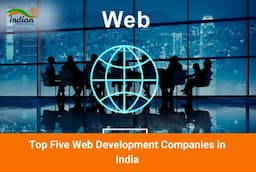How to choose the Right Website Design and Development Company in India

The online space is a non-negotiable expense in the digital-first 2025 environment, regardless of whether you own a small or a large business. The design, functionality, and general user experience of your own web page are of primary importance as they are usually the first impression that the would-be client would have about your brand. Here a professional India based web design and development firm comes in to be of big assistance to you.
India has a prominent IT industry, which has combined large manpower, good manpower of professionals, and low-cost services that work as a good haven in sourcing web development services by businesses that outsource to India. Still, due to a huge number of agencies fighting to attract your attention, it may seem like a dreary task to select the right one. The step-by-step guide should lead you through the most important steps when selecting a partner and general stuff that should be taken into account to be sure everything is done according to the vision and helps to reach the aims in business.
The best way to select an suitable web design and development company in India
Choosing a website design and development company in India to design and develop your website will be a crucial choice that will influence your online success. This decision requires meticulous research, clear communication, and a strategic evaluation of potential partners.
1. Identify clearly your goals and needs.
Before you should even begin to search out a company you should have been immensely clear about what you want your site to do and what needs it should have. This is a preliminary step towards proper communication as well as this step being essential to enable the company to give out a correct proposal.
What is the main goal of your site? (e.g. lead generation, e-commerce, portfolio, information source, community, blog).
Which audience do you target? (age, interests, online habits).
Which functions are required? (e.g. on-line booking, payment gateway, user accounts, CRM integration, advanced search, blog, multi-lingual support).
How do you plan to be content? Are you ready with content (or do you require the content creation services)?
What is your budget range? Be flexible but realistic.
What is your desired launch timeline?
Do you have any branding guidelines or unique aesthetic preferences?
2. Review Their Portfolio and Case Studies
A company's portfolio is a reflection of their abilities, design style, and technical expertise.
Relevance to Your Industry: Check for projects in your industry or closely related business models. This means they know your unique challenges, audience, and industry subtleties.
Quality of Design: Evaluate the look and feel, user interface (UI), and user experience (UX) of their previous work. Are the designs contemporary, clean, and intuitive? Is navigation simple?
Functionality and Complexity: Review the functionalities and features incorporated in their previous websites. Do they show the capacity to manage the complexity your project demands (e.g., custom integrations, dynamic content, e-commerce functionality)?
Responsiveness: In 2025, a website must be fully responsive, meaning it adapts seamlessly to all devices (desktops, tablets, smartphones). Check if their portfolio websites look good and function well across various screen sizes.
Case Studies: Beyond just a gallery, look for detailed case studies. These provide insights into their problem-solving approach, the challenges they overcame, the technologies used, and the measurable results achieved for their clients.
3. Verify Client Testimonials, Reviews, and References
Social proof is very strong. How previous clients review a business can provide valuable information about their communication, reliability, and work quality.
Third-Party Review Sites: Don't just look at the testimonials on their own website. Verify independent sources like Google My Business, Clutch, GoodFirms, or industry-specific Indian business directories.
Specific Feedback: Pay attention to comments regarding communication, adherence to deadlines, project management, post-launch support, and their ability to handle revisions or unexpected issues.
Client References: Don't hesitate to ask for direct client references. Speaking to a former client can provide a deeper understanding of what it's like to work with the company. Ask about their overall satisfaction, project success, and any challenges faced.
4. Evaluate Their Technical Skills and Tech Stack
The technology employed to develop your site will determine its performance, scalability, security, and maintenance costs in the future.
Core Technologies: Ask them about their experience with different programming languages (e.g., HTML, CSS, JavaScript, Python, PHP, Ruby), frameworks (e.g., React, Angular, Vue.js, Laravel, Django, Ruby on Rails, Node.js), and databases (e.g., MySQL, PostgreSQL, MongoDB).
CMS Expertise: In case you are utilizing a Content Management System (CMS) such as WordPress, Drupal, Joomla, or an online store like Shopify or Magento, make sure they possess in-depth knowledge of your selected platform. Inquire about their familiarity with custom theme development, plugin integration, and performance optimization on these platforms.
Responsive Design & Mobile-First Strategy: Verify their dedication to a mobile-first design ethos, which is vital to SEO and user experience in 2025.
SEO Best Practices: A quality company will design your website with SEO in mind from the beginning, ensuring clean code, quick loading speeds, proper implementation of meta-tags, and an SEO-friendly organization.
Security Features: Talk about their methodology of website security, such as SSL certificates, encryption of data, frequent backups, and mitigation of common vulnerabilities.
Scalability: If you see future expansion on the horizon, make sure the technology stack and architecture they're suggesting can grow along with your business without necessitating rebuilding from scratch.
5. Know Their Development Methodology and Project Management
A well-defined, predictable development process guarantees transparency, efficiency, and reproducible results.
Discovery Phase: How do they gather requirements and understand your business?
Design Phase: Do they provide wireframes, mockups, and prototypes for your review and approval? How many revision rounds are included?
Development Phase: What methodologies do they use (e.g., Agile, Waterfall)? How do they manage tasks and progress?
Testing Phase: What kind of testing do they conduct (e.g., functional, performance, security, cross-browser, usability)?
Launch and Deployment: What's their process for launching the website and going live?
Communication: How frequently will they communicate? What tools do they use (e.g., project management software, Slack, email)? Do they have a dedicated project manager assigned?
6. Negotiate Pricing, Contract, and Value Proposition
Cost is important but shouldn't be the only consideration. Value for money is what matters.
Detailed Proposal: Ask for a detailed proposal that succinctly describes the scope of work, inclusions, project schedule, payment schedule, and any monthly expenses (e.g., hosting suggestions, third-party licenses).
Transparent Pricing: Avoid low bids, which could be an attempt to include expenses later or compromise on quality. A good website development company in India will not shy away from sharing all expenses.
Value Proposition: Know what sets them apart. Do they provide strategic advice, marketing know-how, or innovative solutions that bring value beyond coding?
Contract Review: Scrutinize the contract. Make sure it includes intellectual property rights, deliverables, timeline, payment terms, warranties, and post-launch maintenance. If in doubt, seek a legal expert.
7. Post-Launch Support and Maintenance
A website is always a work in progress. Support is important to ensure its long-term performance and security.
Maintenance Packages: Do they have any ongoing maintenance packages that involve frequent updates (CMS, plugins), security scanning, backups, and performance tuning?
Bug Fixes and Troubleshooting: What is their procedure for fixing bugs or problems that crop up after launch? What are the response times?
Future Enhancements: Are they able to offer assistance with future additions or changes to features as your company grows?
Training: Will they give training to your staff on how to work with the CMS, change content, and view basic analytics?
8. Cultural Fit and Cooperation
In addition to technical abilities, the cultural compatibility of your team with theirs can have a great deal to do with the success of the project.
Communication Style: Do they speak clearly, reply in a timely fashion, and really listen to your requirements?
Proactiveness: Do they suggest things, indicate problems, and show proactiveness?
Shared Vision: Do they realize your business philosophy and have your passion for the project?
Trust and Rapport: Can you establish a trust-based relationship with them? A website development project is generally a long-term alliance.
Conclusion
Selecting the proper website design and development firm in India needs to be methodical. By carefully establishing your requirements, properly researching prospective partners' portfolios and client reviews, evaluating their technical competence and development methodologies, and understanding how they price and maintain their products after launch, you can make a smart choice. Keep in mind that a superior website is a valuable investment, not a cost. An appropriate partner will not only design a beautiful and functional website but also a captivating digital property that propels your business ahead in the 2025 competitive market.
Recent Blogs

Top Five Web Development Companies in India

How Much Does it Cost to Design a One Page Website?
